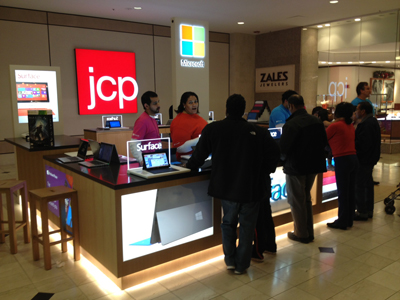Microsoft's Bleak Black Friday
Black Friday does not appear to have been kind to Microsoft, which is banking on robust sales of its new Surface RT, the hybrid tablet-PC launched last month, as well as devices offered by its OEM partners running Windows 8.
Well-respected Piper Jaffray senior research analyst Gene Munster and his team took to their annual ritual of hitting the Mall of America in Minneapolis, where they analyzed traffic at the Apple Store for eight hours for the fifth consecutive Black Friday. This year, the team also spent two hours observing traffic and buying patterns at the new Microsoft Store, which just happened to be across from the Apple Store.
Based on their time spent in both stores, here's what they observed:
- Average traffic at the Microsoft Store was 47 percent less than the Apple Store.
- On average, 3.5 items were purchased per hour at the Microsoft Store. However, all but two were Xbox gaming systems, compared with 17.2 items at the Apple Store.
- No Surfaces were purchased during the two hours the analysts spent at the Microsoft Store.
- The Apple store sold 11 iPads per hour (both the mini and full-sized iPad) compared with 14.8 last year on Black Friday, though the analysts believe the lack of supply of iPad minis may have contributed to the decline in sales.
- Traffic at the Apple Store was up 31 percent over last year.
- The projected growth for iPad sales year-to-year is 62 percent, with more sales moving online.
Piper Jaffray wasn't the only one to report bad Black Friday news for the Surface RT and Windows 8. IBM's annual Digital Analytics Benchmark Black Friday Report found that 88.3 percent of all tablet and smartphone traffic was related to iPads. Granted, that doesn't necessarily reveal how much of that traffic resulted in purchases, but the item that came in second was the Barnes & Noble Nook at a mere 3.1 percent, followed by the Amazon Kindle at 2.4 percent and the Samsung Galaxy with just 1.8 percent of traffic (all based on some derivative of Google's Android). I was unable to ascertain from IBM's report whether it even measured the Surface or Windows 8-based systems; an e-mail and phone call to a spokesman went unanswered.
 |
| A moderate crowd of shoppers at Roosevelt Field mall in Garden City, N.Y. gathered at Microsoft's holiday pop-up store examining the Surface RT. (Credit: Jeffrey Schwartz) |
I didn't spend Black Friday conducting any deep analysis but I did stop in at my local Best Buy, which of course doesn't sell the Surface but did have various Windows 8 systems on display. Some of them, I was dismayed to see, weren't touch-enabled. The Windows 8 machines were overshadowed by Apple's one-day promotion in which the company was discounting its full-sized iPad, not the mini.
Days earlier, I was at the Roosevelt Field mall in Garden City, N.Y., where I visited one of Microsoft's holiday pop-up stores. Unlike it's permanent retail stores, this pop-up store was basically a stand which showcased the Surface and gave a small but barely noticeable amount of real-estate to a few Windows 8 PCs offered by OEMs.
The pop-up store was well-staffed and there were a number of people looking at the Surfaces. The rep behind the counter said the Surface machines were selling well but offered no specifics (however, what sales guy is going to tell a prospective customer that something isn't selling well?). I then strolled over to the Apple Store, which was quite jammed.
One bad day doesn't necessarily spell doom for the Surface and Windows 8 but it is the latest discouraging data point showing the new OS is going slow out of the gate. Just before the Thanksgiving holiday, Forrester Research issued a report concluding Windows 8 appears to be "dead on arrival" in the enterprise.
I got my own dose of that possible reality last month, when I was on a panel called Advances in Mobile Devices: Technologies, Products and Strategies at the Interop 2012 show in New York, where I polled the audience of enterprise IT pros about their support of tablets. I learned that, indeed, most were supporting iPads -- but hardly any had plans for Windows 8-based devices.
Is there any hope for Surface and Windows 8? In a September BusinessWeek article titled "Microsoft's Frantic Race for Third Place," which explored the company's other daunting challenge of making a dent in the smartphone market with Windows Phone 8, Microsoft senior marketing manager Greg Sullivan said, "Our road map for Windows Phone is measured in years, not months." Since Windows Phone 8 is tied to the fortunes of Windows 8, it raises the question: Does Microsoft have years to be successful? The article, which took a mostly pessimistic view toward the prospects for Windows Phone (though it did praise the unique interface), did conclude with some hope. It noted that in 2001, everyone gave Microsoft's Xbox little change of unseating Sony and Nintendo in the gaming market, while today it has a dominant 47 percent share.
Do you think Windows 8, Surface and Windows Phone will share a similar come-from-behind fate over time? Feel free to comment below, or drop me a line at [email protected].
Posted by Jeffrey Schwartz on November 26, 2012